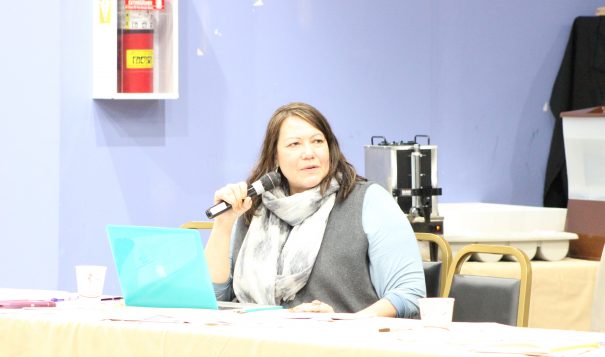Nonprofit media organization created to strengthen Native voices and freedom of the press
 Jodi Rave Spotted Bear, executive director of the Indigenous Media Freedom Alliance, addresses members of the Great Plains Tribal Chairman's Association regarding media issues and the Great Plains tribes.
Jodi Rave Spotted Bear, executive director of the Indigenous Media Freedom Alliance, addresses members of the Great Plains Tribal Chairman's Association regarding media issues and the Great Plains tribes.
By Vi Waln / The Sicangu Scribe
ROSEBUD, S.D. – Prospective tribal journalists in the Great Plains area can look forward to assistance from a new non-profit organization created to increase independent tribal news coverage.
The Indigenous Media Freedom Alliance is a non-profit organization established to promote tribal media literacy, advocate for grassroots news and establish a media broadcast network. Last week, IMFA encouraged members of the Great Plains Tribal Chairman’s Association to consider ways to bring light to issues affecting tribal citizens, one way to do this would be to host press conferences.
“We wait for mainstream media to tell our stories,” stated Jodi Rave Spotted Bear, IMFA executive director. “The NoDAPL [water protector movement] at Standing Rock was a good example of how stories happening in Indian Country are told in a negative tone by mainstream, local media reporters.” Some of the national press wrote some important stories, but they are typically late to the game, she said.
Harold Frazier, President of the Cheyenne River Sioux Tribe agrees. “Reports on the NoDAPL movement were all one-sided from the local media,” he said. “Those reports were not good for Indian people.” He also serves as GPTCA Chairman.
In addition to advocating for independent Native news sources and promoting tribal media literacy, IMFA seeks to revitalize language and culture, as well as promote a Native media broadcast network. Tribal citizens interested in journalism opportunities can visit www.IMFA.us to learn more.
“There are also no journalism programs in tribal colleges,” Rave Spotted Bear said noting one exception, the media communication program at Haskell University. Meanwhile, the IMFA organization seeks to advance a professional Native storytelling community with a primary focus on digital media. IMFA network participants will include working with tribal grassroots media makers, such as reporters, filmmakers, photojournalists and reporters from the Northern Great Plains.
“There are a host of underreported stories in Indian Country due to the lack of seasoned journalists in our tribal communities,” she said. The IMFA network seeks to provide participants with the resources, skills and support they need to deliver news coverage in tribal communities.

“As Indigenous people, we’re basically off the map when it comes to consistent news coverage,” Spotted Bear said. “We don’t have the coverage that a network like MSNBC or CNN can provide. Mainstream media usually only wants to focus their storytelling efforts on the negative news. We need to strengthen our own media outlets to cover Indian Country.”
“Today, we get five minutes of daily radio news coverage from National Native News,” she continued. “A broadcast network is something that’s greatly needed in Indian Country. Through the use of a broadcast network or digital media, stories from Indian Country could be streamed over Hulu, Netflix or Amazon and reach a wider audience.”
Spotted Bear said: “We want to build up tribal journalists on our reservations. As long as people remain uneducated about what’s happening in Indian Country, we will be in this same situation next year.”
Vi Waln is the editor of the Sicangu Scribe, an independent newspaper operated on the Rosebud Reservation in South Dakota. She can be reached at 605-747-2440 or by fax at 855-747-2440.
This article was originally published in May 2017 and appeared in Sicangu Scribe
